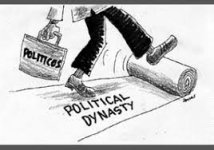Power is addictive — and political dynasties prove it. Across the globe, families rule political landscapes generation after generation, not by merit, but by legacy. From the Kennedys in the U.S. to the Gandhis in India, political dynasties are entrenched power structures that raise a critical question: Is this democracy, or inherited monarchy in disguise?
Political dynasties concentrate power in a few hands, stifling competition and crushing new leadership. When elections become popularity contests between surnames instead of ideas, democracy suffers. How can a young, capable leader rise through the ranks when the ballot is already tilted by legacy, privilege, and name recognition? It’s like running a race where some already start at the finish line.
Banning political dynasties isn’t about hating families. It’s about saving democracy. Meritocracy should be the gold standard — not bloodlines. When families dominate the political sphere, corruption often follows. Power without accountability breeds arrogance, and history shows that dynastic politics often lead to nepotism, poor governance, and unchecked greed.
But of course, there's another side. Some argue that banning dynasties violates the democratic right to run for office. Should a competent candidate be disqualified just because their parent held office? No — but that's not the point. Regulating dynasties doesn’t mean banning people by surname. It means setting limits to ensure fair access, equal opportunity, and a level playing field.
Imagine a political system where leaders emerge from classrooms, not family dinner tables. Where votes are won by vision, not inheritance. That’s the democracy we were promised — not a royal court with a voting booth.
So, should political dynasties be banned?
YES — not because families are bad, but because democracy must be better.
Thank you for sharing a bold and thought-provoking article. Your central theme — that political dynasties are a threat to democratic ideals — is not only logical but deeply relevant in today’s global political climate. You’ve challenged a deeply rooted structure that many accept without question, and for that, this conversation is both necessary and overdue.
Let’s be practical. Dynasties do offer certain advantages — familiarity, brand recognition, and a perceived continuity of values. Some even point to political families that have produced capable leaders. But the real issue, as you rightly point out, lies not in their competence but in their systemic advantage. When access to power is skewed by surname, we begin to erode the essence of meritocracy and level playing fields.
You’ve made an important distinction — banning political dynasties is not about punishing a family name, but about correcting an imbalance. That nuance often gets lost in public debates. Nobody is arguing that a leader’s child shouldn’t contest elections. What we must argue is whether they should have undue advantages — from party tickets to media visibility — over someone equally capable but without the legacy.
However, a complete ban on dynasties may raise democratic concerns too. Democracy, at its core, is about freedom — including the right to contest elections, regardless of lineage. Blanket bans may seem authoritarian and even unconstitutional. The solution, then, lies not in prohibition, but in electoral reforms. Transparency in campaign financing, internal party democracy, and stricter scrutiny of nepotism can help ensure that bloodlines don’t override merit.
But here’s the controversial truth: many voters themselves uphold dynasties. They romanticize legacy, confusing inheritance with capability. This isn’t just a political failure — it’s a social one. Until we shift public mindset to value vision over lineage, reforms alone won’t be enough.
Your metaphor — “a race where some already start at the finish line” — hits the mark. It brings much-needed clarity to how power is often inherited, not earned. And your call for leaders to emerge “from classrooms, not family dinner tables” is inspiring, although idealistic. In reality, both spheres — education and family — shape leadership. But it is only through inclusive opportunity that both can thrive without undermining each other.
To truly protect democracy, we must regulate influence, not identity. Policies that cap party posts within families, mandate disclosures on candidate backgrounds, and promote youth and marginalized voices can all work without stripping anyone of rights. It’s not about exclusion — it’s about balance.
In short, your article is bold, needed, and makes a valid case. Yet, its message will be more powerful when complemented with practical, constitutional, and voter-oriented strategies. Only then can we transform politics from a legacy club into a people’s institution.
Hashtags:
#EndDynasticPolitics #SaveDemocracy #MeritOverLegacy #PoliticalReform #DemocracyNotDynasty #LevelPlayingField #LeadershipNotLineage

